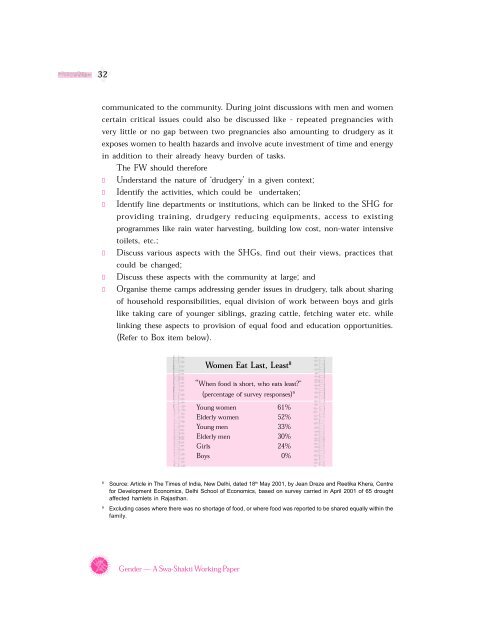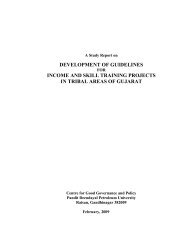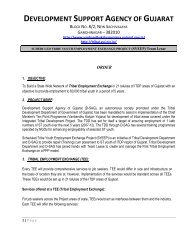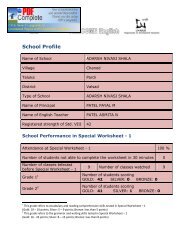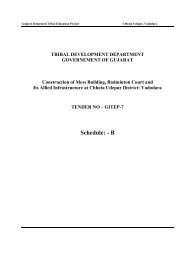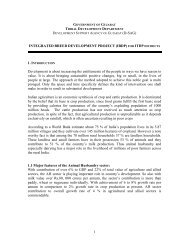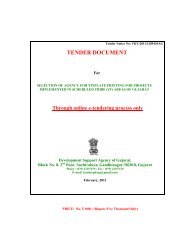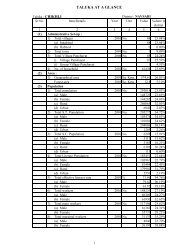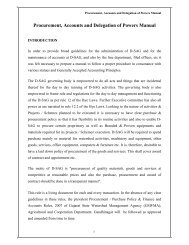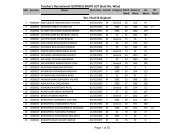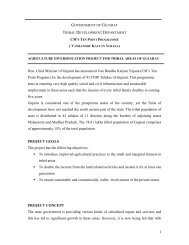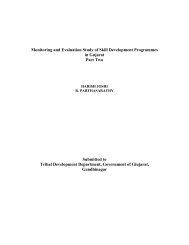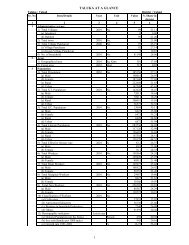A Swa-Shakti Working Paper - Vanbandhu Kalyan Yojana
A Swa-Shakti Working Paper - Vanbandhu Kalyan Yojana
A Swa-Shakti Working Paper - Vanbandhu Kalyan Yojana
You also want an ePaper? Increase the reach of your titles
YUMPU automatically turns print PDFs into web optimized ePapers that Google loves.
32<br />
certain<br />
communicated<br />
critical<br />
to<br />
issues<br />
the community.<br />
could also be<br />
During<br />
discussed<br />
joint<br />
like<br />
discussions<br />
- repeated<br />
with<br />
pregnancies<br />
men and women<br />
very little or no gap between two pregnancies also amounting to drudgery<br />
with<br />
exposes women to health hazards and involve acute investment of time and energy<br />
as it<br />
in addition<br />
The FW<br />
to<br />
should<br />
their already<br />
therefore<br />
heavy burden of tasks.<br />
Understand<br />
Identify the<br />
the<br />
activities,<br />
nature<br />
which<br />
of ‘drudgery’<br />
could be<br />
in a<br />
undertaken;<br />
given context;<br />
Identify<br />
providing<br />
line<br />
training,<br />
departments<br />
drudgery<br />
or institutions,<br />
reducing<br />
which<br />
equipments,<br />
can be linked<br />
access<br />
to the<br />
to<br />
SHG<br />
existing<br />
for<br />
programmes<br />
toilets, etc.;<br />
like rain water harvesting, building low cost, non-water intensive<br />
Discuss<br />
could be<br />
various<br />
changed;<br />
aspects with the SHGs, find out their views, practices that<br />
Discuss<br />
Organise<br />
these<br />
theme<br />
aspects<br />
camps<br />
with<br />
addressing<br />
the community<br />
gender issues<br />
at large;<br />
in drudgery,<br />
and<br />
of household responsibilities, equal division of work between<br />
talk<br />
boys<br />
about<br />
and<br />
sharing<br />
like taking care of younger siblings, grazing cattle, fetching water etc. while<br />
girls<br />
linking<br />
(Refer to<br />
these<br />
Box<br />
aspects<br />
item below).<br />
to provision of equal food and education opportunities.<br />
Women Eat Last, Least8<br />
“When<br />
(percentage<br />
food is<br />
of<br />
short,<br />
survey<br />
who eats least?”<br />
responses)9<br />
Young<br />
Elderly<br />
women<br />
women<br />
61%<br />
Young men 33%<br />
52%<br />
Elderly<br />
Girls<br />
men 30%<br />
Boys<br />
24%<br />
0%<br />
8<br />
Source: Article in The Times of India, New Delhi, dated 18 th May 2001, by Jean Dreze and Reetika Khera, Centre<br />
for Development Economics, Delhi School of Economics, based on survey carried in April 2001 of 65 drought<br />
affected hamlets in Rajasthan.<br />
9<br />
Excluding cases where there was no shortage of food, or where food was reported to be shared equally within the<br />
family.<br />
Gender — A <strong>Swa</strong>-<strong>Shakti</strong> <strong>Working</strong> <strong>Paper</strong>


